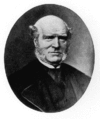- Cities and Villages Act of 1872
-
The Cities and Villages Act of 1872 is a piece of Illinois legislation that governs the operation of unincorporated groups of habitations within the state. The act was an immediate source of political controversy. The legacy of the Act is that municipal elections take place in the spring while county, state, and federal elections continue to occur on the federal Election Day.
Contents
History
The Act was adopted by the State of Illinois on April 10, 1872 and went into force on July 1 of the same year. The purpose of the Act was to provide a standard outline and means for villages and cities in the state to incorporate without requiring separate legislation for each application.[1]
On April 23, 1875, the city of Chicago voted to operate under the Act, as opposed to operating under the city charter which had previously been in effect.[2] The Act has been revised since then, and is located in Chapter 65 of the Illinois Compiled Statutes.[2]
Despite this operation, the Illinois State Constitution was later amended by the addition of Article VII (Adopted September 3, 1970; Entered into force July 1, 1971) which grants home rule powers to Chicago. Among those powers are regulation for the protection of public health, safety, morals, and welfare, to license for regulatory purposes, to tax, and to incur debt.[2]
Legal implications
 Thomas Hoyne, irregularly elected Mayor
Thomas Hoyne, irregularly elected Mayor
The act moved Mayoral elections to April, whereas they had previously taken place in November. The politically manipulated late April adoption date effectively canceled the 1875 election for Mayor of Chicago.[3] The act also lengthened the Mayoral term from 1 year to 2 years and expanded Mayoral powers.[4] The law was ambiguous on the extension of incumbent mayor, Harvey Doolittle Colvin's, one year term.[4]
In the November 1875 elections, neither the Republicans nor the Democrats ran a candidate for mayor, believing that there was no election. Independent candidate Thomas Hoyne received over 82% of the votes for Mayor of Chicago. Colvin refused to surrender his seat, which lead to turmoil until a court ruling declared him Mayor until a special election, thus nullifying Hoyne's election.[4]
Chicago continues to have municipal elections in the spring. 1907 ushered in 4-year Mayoral terms and 1935 saw the first 4-year Aldermanic terms. Among the offices up for election in 2007 are Mayor of Chicago, City Clerk, City Treasurer and the 50 City Council Aldermen.
External links
Notes
- ^ "Encyclopedia of Chicago "Statutes of Illinois, Acts of 1871 and 1872"". Chicago Historical Society. http://www.encyclopedia.chicagohistory.org/pages/11312.html. Retrieved 2007-01-18.
- ^ a b c "Legal Organization and Charter, City of Chicago". Chicago Public Library. http://www.chipublib.org/004chicago/chichart.html. Retrieved 2007-01-18.
- ^ Einhorn, Robin. "Encyclopedia of Chicago, "Political Culture"". Chicago Historical Society. http://www.encyclopedia.chicagohistory.org/pages/987.html. Retrieved 2007-01-19.
- ^ a b c Holli, Melvin G.. "Encyclopedia of Chicago, "Mayors"". Chicago Historical Society. http://www.encyclopedia.chicagohistory.org/pages/795.html. Retrieved 2007-01-19.
City of Chicago Architecture · Beaches · Climate · Colleges and Universities · Community areas · Culture · Demographics · Economy · Flag · Freeways · Geography · Government · History · Landmarks · Literature · Media · Music · Neighborhoods · Parks · Public schools · Skyscrapers · Sports · Theatre · Transportation
 Category ·
Category ·  PortalCategories:
PortalCategories:- History of Chicago, Illinois
- Chicago, Illinois stubs
- United States law stubs
- Illinois stubs
Wikimedia Foundation. 2010.
